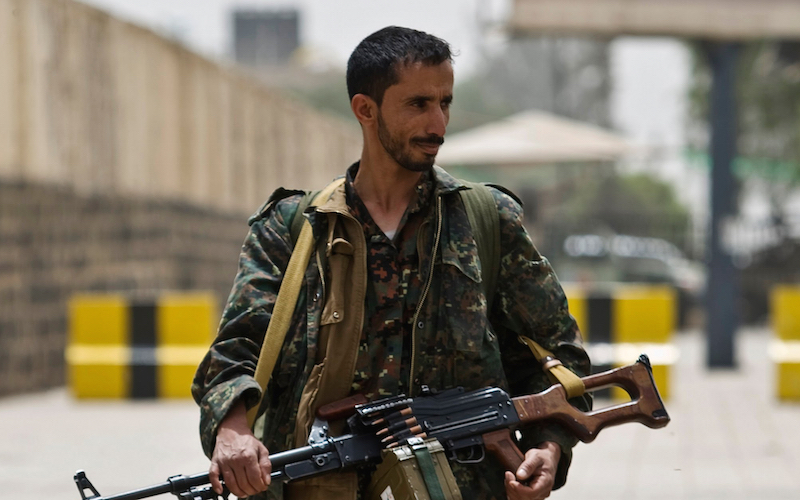
Yemen Brinkmanship
Most Yemeni did not expect much from the UN Geneva talks of 15th June; the model had not worked well for Syria. Arab Felix confidence was at a low ebb, meaning failure was not a surprise. The situation in Yemen is complex which means delay. Delay means more suffering. The conflict is now essentially out of the hands of the people. If brinkmanship is about “allowing a situation to become extremely dangerous in order to get results, then the people of Yemen are the quintessential case study and the ultimate casualties.” What is to be done?
The Yemeni conflict has been destroying the country for four years and is now clearly a territorial issue that involves many players, but largely out of the hands of the majority of the Yemeni. Thus dialogue seems fruitless unless it involves the people and is firmly based on solutions vested within the underlying factors that have and drive both the internal and external contexts.
The Yemeni know the value of negotiation and indeed since the so-called Arab Spring swept Yemen in 2011, Yemeni have been in virtually a perpetual state of dialogue of one form or another, including the main event of the National Dialogue Conference which many conclude catalyzed the current conflicts.
It ended largely unsuccessfully despite the unprecedented opportunity presented including the road map to a new Constitution, Referendum and Presidential and Parliamentary elections. The Houthis and Saleh destroyed all Yemen’s hard work, optimism and achievements through dialogue. Equally and some may argue more importantly, they washed away Yemen’s credibility as a model of transformational success and as an American heralded example of an alliance of approaches to countering violent extremism, specifically relating to Al Qaeda on the Arabian Peninsula (AQAP).
Yemeni is now at the bottom of almost every international and regional list in terms of instability, displaced people, poverty, starvation and water shortages, etc.
The country is in misery. The Arab coalition bombs. Strikes seem to kill more each time. 176 were killed in one recently reported strike. There are no plans to put boots on the ground which would secure the people. Airpower cannot win hearts and minds.
In the meantime, as a result, the people just suffer, the country further deteriorates and solutions simply become more difficult. Political rivals have become more concerned about their own agendas. There is a distinct absence of any form of Yemeni nationalism and/or concessions for peace among the parties nor a sense of urgency to relieve the suffering of the people. It is therefore no surprise that Yemeni have lost their will. No one felt Geneva would achieve much and it did not. The “parties” involved viewed even the purpose of the talks differently. Groups used Geneva for their own ends and individual gains. None were willing to take a risk to achieve peace nor make concessions for the sake of people of Yemen.
Pressure was put on President Hadi to attend the talks. There is a growing sense of disconnection between Yemeni and Hadi’s government seen as in exile in Saudi Arabia. Some unhelpfully comment that Hadi feels victorious to have the Arab coalition striking the Houthis and Saleh’s forces as revenge for challenging his legitimacy and for putting him under house arrest for months. Hadi showed enthusiasm for Geneva because there seemed no other option; solid UN vision is absent following the loss of the expertise of the envoy, Dr. Jamal Benomar.
The conflict in Yemen is widening and deepening. Some say the country is drifting, The humanitarian situation is getting worse – another humanitarian truce is expected soon – yet the supplies are not getting through and the services are threadbare. The UN talks of a humanitarian disaster and has voiced “deep concern.” Reports suggest that 1,500 civilians are dead, 3,600 injured and a million internally displaced in the last three months alone. The population is fragmenting on ethnic and sectarian grounds. Meanwhile, the world watches Yemen burn and within the ashes the promise of a country that was developing and making credible progress; nobody seems to care.
If progress is to be made then parties must return to the negotiating table which this time must be brokered in a manner consistent with the culture and which promises less with the hope of delivering more. Efforts to end the violence and suffering must continue, but once the parties begin to talk the agenda should be talks about talks; “Talks about talks allow all groups to be involved in a long process determining, with common agreement, who must be involved and why. Talks about talks do not threaten the outcome but they ensure everyone feels represented. Talks about talks allow people to air their grievances rather than have those grievances pop up within the actual discussions where and when their presence could blow the whole thing apart.” It will take a long time to see Yemen back on track, but for the people, the victims of brinkmanship, it is surely worth it!


